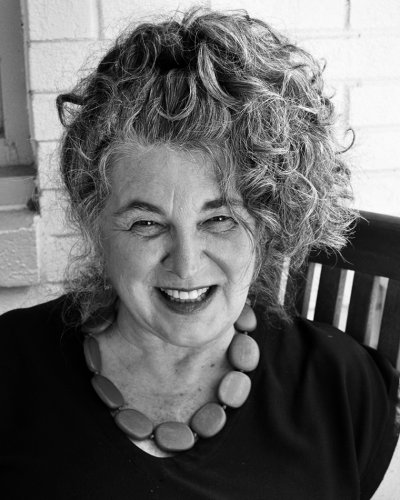We use cookies to improve our services and remember your choices for future visits. For more information see our Privacy Policy and Terms of Use.
Farewell My Lovelies
Colleen Donfield’s Goodbye after Twenty-Five Years at The Sun

SUN MANUSCRIPT EDITOR COLLEEN DONFIELD
“Just over ten years ago,” Sun contributor Joe Wilkins writes, “I got a letter — that was back when people wrote letters — from Colleen Donfield. She’d read an essay of mine in another journal and admired it and thought I should send something to her at The Sun. It was the first time I’d ever been asked to send my work to a magazine, and one of the first times I felt like maybe I was a real writer.”
As Colleen retires from being The Sun’s manuscript editor after twenty-five years, stories like this — stories that speak to Colleen’s sincerity and voracious appetite for good writing, to her encouragement and big heart — come as bittersweet. We’re glad she’s taking some time for herself, but we know how much we’re going to miss her.
Colleen’s route to The Sun was circuitous: college, a stint at an environmental-consulting organization, temping at a nonprofit research group. But her love of reading was a constant from an early age. She was about eleven years old (“Way too young!” she says) when she read her first Joyce Carol Oates book. “It completely freaked me out,” she says. “It was about a broken family, and, coming from a broken family myself, I just thought, Life can get really bad, really quick.” The impression the book made on her — “the typical American dysfunction story that showed how enormous the world is for ordinary people,” in Colleen’s words — was lasting. “I realized pretty early on that if I could have a job just reading, I’d be happy. And when I heard about the position at The Sun, I thought, That’s a job I’d make up for myself.”
The first time Colleen returned a box of manuscripts to Sy Safransky, The Sun’s founder and editor, she’d haphazardly thrown together the stacks of paper. Her colleagues, also new to the magazine, were too shy to tell her there couldn’t have been a worse way to start. “Can you maybe start putting these in order?” he asked her.
Once she (mostly) got the hang of her new boss’s zeal for organization, Colleen settled into a role that’s been ideal for her: reading thousands of manuscripts and communicating with writers whose work she loves. “The most important thing to me has been to encourage writers: to make The Sun a place where writers aren’t going to feel ashamed or embarrassed to send us work. Getting a good manuscript, no matter where it comes from, is just the most exciting thing in the world to me. I love that.” Love is a word that comes up more than any other when she talks about writing. Though she’s as critical as any editor you’re likely to meet, she’s most often heard singing the praises of something she wants to see published.
Colleen’s done an enormous — there seems to be no better word to describe it — amount of reading over the past twenty-five years. When asked how so much reading has shaped her, she says, “I notice, when I’m talking to friends or family, how much I’ve thought about death, since so many of the manuscripts we receive touch on it, such that I’m not very afraid of it anymore. I find it easier to speak about difficult things with people. For instance, I was able to call my uncle in California when he was dying and tell him what I felt about him. My sister asked me how I could do that, and I said, ‘You don’t understand what I spend time with every day!’ ”
Inevitably, if you read so much for a magazine with such limited space, a lot of your work involves writing rejections. But Colleen maintains collegial relationships with dozens of writers who’ve been told no again and again. “Kindness goes a long way,” she says. “I often tell writers what I personally liked about a piece, even if it wasn’t right for The Sun. And I think that’s made my job easier.”
We figured Colleen would want to spend most of her new free time behind a sewing machine. (She makes all of her own clothes and is generally the best-dressed person in the office.) But when asked what she’s planning to do in her retirement in the next year, she characteristically mentions reading a book: The Gentle Art of Swedish Death Cleaning. “It means cleaning out your house so that nobody has to do it for you after you die. It’s basically Marie Kondo with a better title.” She’s also planning to volunteer her time to getting U.S. Senator Thom Tillis out of office. “I was going to go to Kentucky and work for Mitch McConnell’s opponent, but then I remembered we have our own lousy senator here in North Carolina.”
We’re grateful to Colleen for the years she’s spent shepherding manuscripts, encouraging writers, and shaping so many of the pieces we’ve published in The Sun.
— Derek Askey, Assistant Editor
We’ll mail you a free copy of this month’s issue. Plus you’ll get full online access—including more than 50 years of archives.
Request a Free Issue